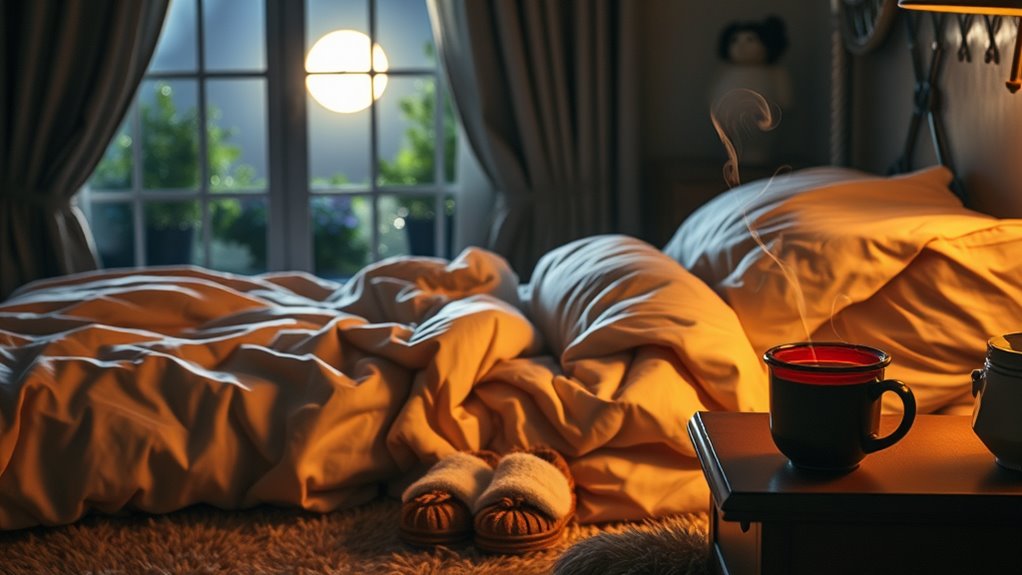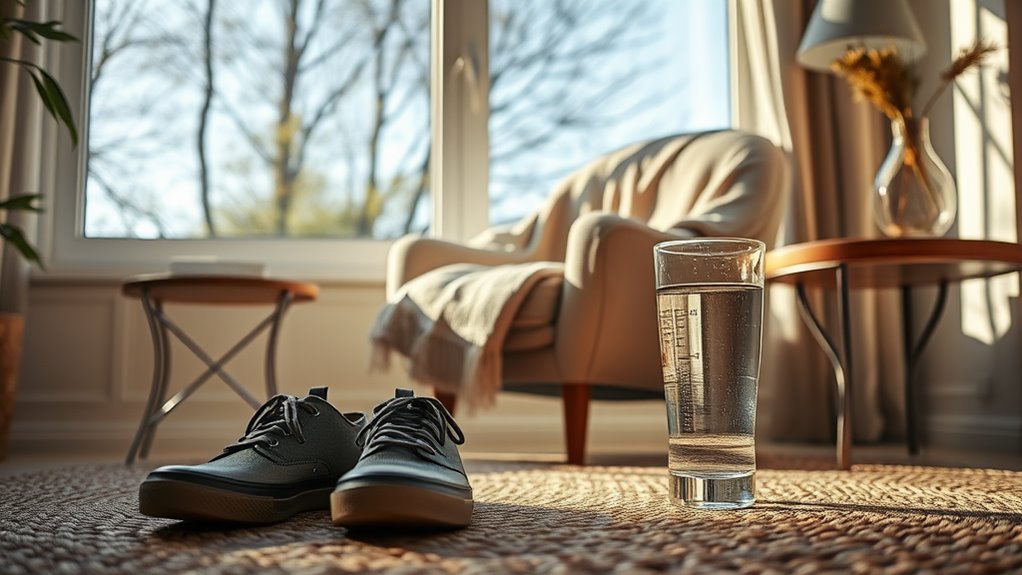Best Remedy for Restless Nights and Tired Legs
Many people don’t realize that restless legs syndrome can disrupt sleep more than just anxiety or stress. If you’ve ever found yourself tossing and turning due to an uncomfortable sensation in your legs, you know how exhausting it can be. Fortunately, there are effective remedies to help you reclaim your nights. Discovering the right combination of lifestyle changes and natural solutions can make all the difference in achieving restful sleep.
Key Takeaways
- Establish a consistent sleep schedule and create a calming bedtime routine to promote relaxation and improve sleep quality.
- Incorporate leg stretches and gentle exercises to relieve tension and reduce discomfort in the legs.
- Limit caffeine and alcohol consumption in the evening to prevent disruptions in sleep patterns.
- Stay hydrated and consume nutrient-rich foods, focusing on magnesium and iron to support overall health and mitigate RLS symptoms.
- Utilize natural remedies like valerian root, chamomile, or essential oils to enhance relaxation and encourage better sleep.
Understanding Restless Legs Syndrome
Restless Legs Syndrome (RLS) can feel like an unwelcome intruder in your nightly routine. This condition causes an irresistible urge to move your legs, often accompanied by uncomfortable sensations. You might find it especially bothersome when you’re trying to relax or sleep. Understanding RLS is vital for finding effective restless leg remedies. Many people experience symptoms in the evening or at night, disrupting their sleep patterns. Simple remedies can help alleviate discomfort, like stretching, massaging your legs, or applying heat. Additionally, some find relief through over-the-counter treatments or by adjusting their diet. Establishing a consistent sleep routine can also be beneficial in managing symptoms.
It’s important to note that iron deficiency can be a common trigger for RLS, affecting your overall comfort and sleep quality. Identifying triggers, such as caffeine or stress, can also lead you to better manage RLS. With the right approach, you can reclaim restful nights and enjoy peaceful sleep again.
Lifestyle Changes for Better Sleep
To achieve better sleep, making a few lifestyle changes can be incredibly beneficial.
Start by establishing a consistent sleep schedule; going to bed and waking up at the same time each day helps regulate your body’s internal clock.
Limit caffeine and nicotine intake, especially in the afternoon and evening, as these stimulants can disrupt your sleep.
Create a calming bedtime routine by engaging in relaxing activities, like reading or meditating, to signal your body that it’s time to wind down. Incorporating herbal teas for relaxation like chamomile or lavender can enhance your winding down process.
Make sure your sleep environment is comfortable: a cool, dark, and quiet room promotes better rest.
Finally, avoid heavy meals close to bedtime, as digestion can interfere with your ability to fall asleep. Incorporating relaxation techniques such as deep breathing or gentle yoga can further enhance your ability to unwind before sleep.
These changes can greatly improve your sleep quality.
Effective Stretching and Exercise Techniques
To improve your sleep quality, incorporating effective stretching and exercise techniques can make a big difference.
Simple leg stretches and relaxation techniques can help release tension, while strengthening exercises contribute to overall well-being. Regular stretching can also help alleviate symptoms of Restless Leg Syndrome, promoting a more restful night’s sleep.
Let’s explore how these strategies can transform your nights into more restful ones.
Simple Leg Stretches
When you’re struggling to get a good night’s sleep, incorporating simple leg stretches into your routine can make a significant difference.
Start with a calf stretch: stand facing a wall, place your hands on it, step one foot back, and press your heel down. Hold for 20-30 seconds, then switch sides.
Next, try hamstring stretches by sitting on the floor with one leg extended, reaching for your toes. Hold this position for the same duration.
Finally, perform a quadriceps stretch by standing, bending one knee, and pulling your foot toward your glutes.
These stretches not only ease tension in your legs but also promote relaxation. Regular practice can help alleviate discomfort and improve your overall sleep quality.
Relaxation Techniques Overview
While many struggle with restless nights, incorporating effective relaxation techniques can greatly enhance your sleep quality.
Start by practicing deep breathing exercises; inhaling deeply through your nose and exhaling slowly through your mouth helps calm your mind.
Gentle stretching can also relieve tension in your legs and promote relaxation. Consider yoga or simple leg stretches to release tight muscles.
Additionally, progressive muscle relaxation encourages you to tense and then relax each muscle group, helping you unwind.
Don’t forget to create a calming environment—dim the lights, play soft music, or use aromatherapy.
Strengthening Exercises Guide
Building on those relaxation techniques, incorporating strengthening exercises into your routine can further enhance your sleep quality and overall well-being.
Focus on leg-strengthening workouts, like squats, lunges, and calf raises. These exercises improve circulation, alleviate tired legs, and promote muscle stability. Aim for two to three sessions a week, and always warm up with gentle stretches to prevent injury.
Additionally, consider incorporating yoga poses such as downward dog and warrior to increase flexibility and relaxation. Gradually increase intensity, listening to your body’s signals.
Remember to finish with a cool-down phase to promote recovery. By committing to these strengthening exercises, you’ll not only tackle restless nights but also boost your overall energy and liveliness during the day.
Dietary Adjustments to Alleviate Symptoms
When it comes to restless nights, your diet plays a vital role in how well you sleep. Incorporating nutrient-rich foods, staying hydrated, and managing your caffeine and alcohol intake can make a significant difference. Additionally, proper hydration supports nutrient absorption and can help improve overall sleep quality. Let’s explore how these dietary adjustments can help you find the restful sleep you deserve.
Nutrient-Rich Foods
A well-balanced diet can play an essential role in alleviating the symptoms of restless nights. Focus on nutrient-rich foods that support your overall health and well-being.
Incorporate magnesium-rich foods like spinach, almonds, and black beans, as magnesium helps relax your muscles and nerves. Don’t forget iron, found in lean meats, lentils, and fortified cereals, which is vital for preventing restless leg syndrome.
Omega-3 fatty acids from fish, walnuts, and flaxseeds can also help reduce inflammation and improve sleep quality.
Finally, make sure you’re getting enough vitamin D from sources like fatty fish and fortified dairy products, as it supports overall muscle function.
Hydration Importance
While a nutrient-rich diet lays a solid foundation for better sleep, hydration is another key factor that shouldn’t be overlooked. Staying well-hydrated helps regulate your body temperature, supports circulation, and can reduce the discomfort of tired legs.
When you’re dehydrated, you might experience muscle cramps or restless sensations, making it harder to unwind at night. Aim for at least eight glasses of water a day, but adjust based on your activity level and climate.
Herbal teas can also be a soothing option before bedtime. Just remember to avoid overloading on fluids right before sleep to prevent those annoying nighttime trips to the bathroom.
Prioritize hydration, and you’ll likely notice an improvement in your sleep quality and leg comfort.
Caffeine and Alcohol Limits
How much caffeine and alcohol are you consuming in the hours leading up to bedtime? These substances can greatly impact your sleep quality and exacerbate feelings of restlessness.
Caffeine, found in coffee, tea, and some sodas, can stay in your system for up to eight hours, so try to limit your intake after mid-afternoon.
As for alcohol, while it may initially help you fall asleep, it disrupts your sleep cycle, leading to more restless nights. Aim to keep your alcohol consumption moderate, ideally avoiding it at least three hours before bed.
By making these dietary adjustments, you can create a more restful environment for yourself, helping to alleviate those restless nights and tired legs.
Prioritize your sleep; your body will thank you!
Natural Remedies and Supplements
When sleepless nights leave you feeling drained, exploring natural remedies and supplements can offer a gentle path to better rest. Herbs like valerian root and chamomile have calming properties that may help you unwind before bed. Additionally, magnesium can relax your muscles and reduce leg discomfort, making it easier to drift off. You might also consider melatonin supplements, which can regulate your sleep-wake cycle. Essential oils, such as lavender and bergamot, can create a soothing atmosphere when diffused in your bedroom. To enhance your experience, try incorporating a bedtime routine that includes deep breathing or gentle stretching. Regular use of herbal remedies can significantly improve sleep quality and overall well-being. Incorporating unconventional breathing techniques like the 4-7-8 method can also promote relaxation and aid in falling asleep more quickly.
When to Seek Professional Help
If you find that your sleep disturbances persist despite trying various home remedies, it’s essential to seek professional help. Consider consulting a healthcare provider if you frequently wake up feeling exhausted, experience leg pain, or notice symptoms like tingling or cramps. These issues may indicate underlying conditions such as restless legs syndrome or sleep apnea. Additionally, if anxiety or stress keeps you awake, talking to a therapist could provide you with valuable coping strategies. Practicing paradoxical intention may also help reduce anxiety and improve your ability to fall asleep.




